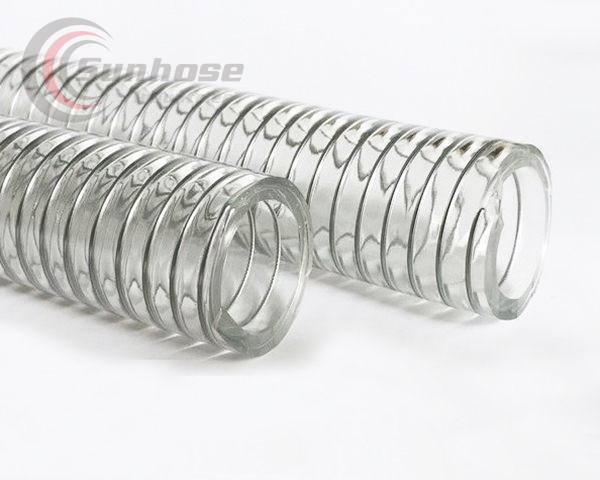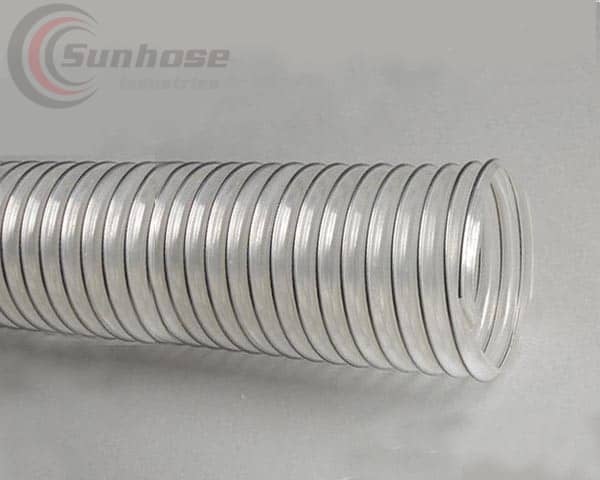PVC Steel Wire Reinforced Hose vs. Polyurethane Hose: A Comparative Analysis
When it comes to selecting the right hose for your specific needs, two popular options often come to mind: PVC Steel Wire Reinforced Hose and Polyurethane Hose. Both hoses have their unique advantages and are suitable for various applications. Let’s delve into a comparative analysis to help you make an informed decision:
1. Material Composition:
- PVC Steel Wire Reinforced Hose: This hose is made from PVC (Polyvinyl Chloride) material, strengthened with a steel wire helix, which provides excellent flexibility and durability.
steel wire reinforced PVC hose
- Polyurethane Hose: Polyurethane is a synthetic polymer, offering high abrasion resistance and flexibility, making it ideal for rugged applications.
TPU Suction Hose
2. Flexibility:
- PVC Steel Wire Reinforced Hose: With its steel wire reinforcement, this hose maintains its shape even under pressure, ensuring smooth flow and preventing kinks.
- Polyurethane Hose: Polyurethane hoses are extremely flexible, making them perfect for use in tight spaces or applications requiring frequent movement.
3. Temperature Range:
- PVC Steel Wire Reinforced Hose: Typically suitable for moderate temperature ranges, making it suitable for many standard applications. Temp. Range. : -10° C / +65° C (-14° F / +150° F)
- Polyurethane Hose: This hose can withstand a broader range of temperatures, including both low and high extremes, expanding its usability. Temp. Range. : – 35 ̊C to +90 ̊C (95°F to 194°F)
4. Abrasion Resistance:
- PVC Steel Wire Reinforced Hose: While generally durable, it may not be as resistant to abrasion as polyurethane hoses.
- Polyurethane Hose: Known for its exceptional abrasion resistance, polyurethane hoses are preferred in applications where wear and tear are common.
5. Chemical Compatibility:
- PVC Steel Wire Reinforced Hose: Has good resistance to a variety of chemicals, but compatibility should be checked for specific applications.
- Polyurethane Hose: Exhibits excellent resistance to a wide range of chemicals, making it a suitable choice for industries dealing with corrosive substances.
6. Applications:
- PVC Steel Wire Reinforced Hose: Commonly used in light to moderate-duty applications, such as irrigation, drainage, and vacuum lines.
- Polyurethane Hose: Well-suited for heavy-duty applications, including pneumatic tools, hydraulic equipment, and abrasive material transfer.
7. Cost:
- PVC Steel Wire Reinforced Hose: Generally more economical, making it a cost-effective option for many applications.
- Polyurethane Hose: Slightly higher in cost due to its advanced properties, but the long-term benefits can outweigh the initial investment.
In conclusion, both PVC Steel Wire Reinforced Hose and Polyurethane Hose have their merits, and the choice depends on the specific requirements of your application. PVC hoses are budget-friendly and work well for standard applications, while polyurethane hoses are a premium choice for demanding and abrasive environments. Evaluating factors such as flexibility, temperature range, chemical compatibility, and durability will help you determine the best fit for your needs.




 Sunhose
Sunhose